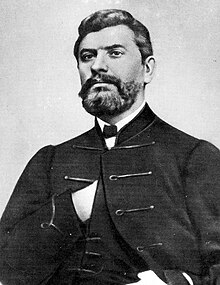
Franjo Tuđman, also written as Franjo Tudjman, was a Croatian politician and historian. Following the country's independence from Yugoslavia, he became the first president of Croatia and served as president from 1990 until his death in 1999. He was the ninth and last President of the Presidency of SR Croatia from May to July 1990.

The Croatian Spring, or Maspok, was a political conflict that took place from 1967 to 1971 in the Socialist Republic of Croatia, at the time part of the Socialist Federal Republic of Yugoslavia. As one of six republics comprising Yugoslavia at the time, Croatia was ruled by the League of Communists of Croatia (SKH), nominally independent from the League of Communists of Yugoslavia (SKJ), led by President Josip Broz Tito. The 1960s in Yugoslavia were marked by a series of reforms aimed at improving the economic situation in the country and increasingly politicised efforts by the leadership of the republics to protect the economic interests of their respective republics. As part of this, political conflict occurred in Croatia when reformers within the SKH, generally aligned with the Croatian cultural society Matica hrvatska, came into conflict with conservatives.

League of Communists of Croatia was the Croatian branch of the League of Communists of Yugoslavia (SKJ). It came into power in 1945. Until 1952, it was known as Communist Party of Croatia. In the early 1990s, it underwent several renames and lost power.

The Croatian Democratic Union is a major conservative, centre-right political party in Croatia. It is one of the two major contemporary political parties in Croatia, along with the centre-left Social Democratic Party (SDP). It is currently the largest party in the Sabor with 62 seats. The HDZ governed Croatia from 1990 before the country gained independence from Yugoslavia until 2000 and, in coalition with junior partners, from 2003 to 2011, and since 2016. The party is a member of the European People's Party (EPP). The HDZ's leader, Andrej Plenković, is the current Prime Minister of Croatia, having taken office following the 2016 parliamentary election.
"Muslims" is a designation for the ethnoreligious group of Serbo-Croatian-speaking Muslims and people of Muslim heritage, inhabiting mostly the territory of the former Socialist Federal Republic of Yugoslavia. The term, adopted in the 1971 Constitution of Yugoslavia, groups together a number of distinct South Slavic communities of Islamic ethnocultural tradition. Prior to 1993, a vast majority of present-day Bosniaks self-identified as ethnic Muslims, along with some smaller groups of different ethnicity, such as Gorani and Torbeši. This designation did not include Yugoslav non-Slavic Muslims, such as Turks, some Romani people and majority of Albanians.
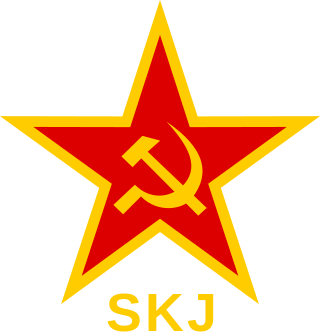
The League of Communists of Yugoslavia, known until 1952 as the Communist Party of Yugoslavia, was the founding and ruling party of SFR Yugoslavia. It was formed in 1919 as the main communist opposition party in the Kingdom of Serbs, Croats and Slovenes and after its initial successes in the elections, it was proscribed by the royal government and was at times harshly and violently suppressed. It remained an illegal underground group until World War II when, after the invasion of Yugoslavia in 1941, the military arm of the party, the Yugoslav Partisans, became embroiled in a bloody civil war and defeated the Axis powers and their local auxiliaries. After the liberation from foreign occupation in 1945, the party consolidated its power and established a one-party state, which existed in that form of government until 1990, two years prior to the breakup of Yugoslavia.

Greater Croatia is a term applied to certain currents within Croatian nationalism. In one sense, it refers to the territorial scope of the Croatian people, emphasising the ethnicity of those Croats living outside Croatia. In the political sense, though, the term refers to an irredentist belief in the equivalence between the territorial scope of the Croatian people and that of the Croatian state.
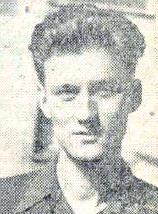
Ante "Miko" Tripalo was a Croatian politician. He was one of the members of Croatian Spring, a movement for higher level of autonomy of SR Croatia within SFR Yugoslavia.
The State Anti-Fascist Council for the National Liberation of Croatia, commonly abbreviated ZAVNOH, was first convened on 13–14 June 1943 in Otočac and Plitvice as the chief political representative body in World War II Axis-occupied Croatia. It was dominated by the Communist Party of Croatia, a nominally-independent political party active in the territory largely corresponding to present-day Croatia. Despite its nominal independence, the party was a de facto branch of the Josip Broz Tito-led Communist Party of Yugoslavia. ZAVNOH also included representatives or former members of peasant organisations, trade unions, the Croatian Peasant Party, and the Independent Democratic Party.
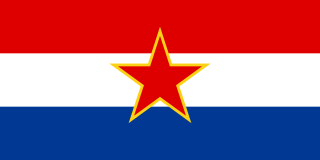
The Socialist Republic of Croatia, commonly abbreviated as SR Croatia and referred to as simply Croatia, was a constituent republic and federated state of the Socialist Federal Republic of Yugoslavia. By its constitution, modern-day Croatia is its direct continuation.
Mate Boban was a Bosnian Croat politician and one of the founders of the Croatian Republic of Herzeg-Bosnia, an unrecognized entity within Bosnia and Herzegovina. He was the 1st President of Herzeg-Bosnia from 1991 until 1994.
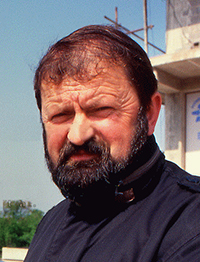
Blaž Nikola Kraljević was a Bosnian Croat paramilitary leader who commanded the Croatian Defence Forces (HOS) during the Bosnian War. An immigrant to Australia, Kraljević joined the Croatian Revolutionary Brotherhood (HRB) upon his arrival there in 1967. During his return to Yugoslavia in January 1992 he was appointed by Dobroslav Paraga, leader of the Croatian Party of Rights (HSP), as leader of the HOS in Bosnia and Herzegovina.

Ante Starčević was a Croatian politician and writer. His policies centered around Croatian state law, the integrity of Croatian lands, and the right of his people to self-determination. As an important member of the Croatian parliament and the founder of the Party of Rights he has laid the foundations for Croatian nationalism. He has been referred to as Father of the Nation due to his campaign for the rights of Croats within Austria-Hungary and his propagation of a Croatian state in a time where many politicians sought unification with other South Slavs.
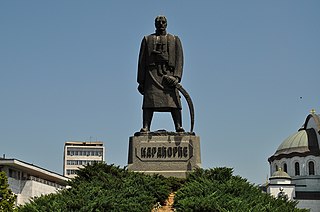
Serbian nationalism asserts that Serbs are a nation and promotes the cultural and political unity of Serbs. It is an ethnic nationalism, originally arising in the context of the general rise of nationalism in the Balkans under Ottoman rule, under the influence of Serbian linguist Vuk Stefanović Karadžić and Serbian statesman Ilija Garašanin. Serbian nationalism was an important factor during the Balkan Wars which contributed to the decline of the Ottoman Empire, during and after World War I when it contributed to the dissolution of the Austro-Hungarian Empire, and again during the breakup of Yugoslavia and the Yugoslav Wars of the 1990s.

Bosniak nationalism or Bosniakdom is the nationalism that asserts the nationality of Bosniaks and promotes the cultural unity of the Bosniaks. It should not be confused with Bosnian nationalism, often referred to as Bosniandom, as Bosniaks are treated as a constituent people by the preamble of Constitution of Bosnia and Herzegovina, whereas people who identify as Bosnians for nationality are not. Bosniaks were formerly called Muslims in census data but this model was last used in the 1991 census.

Yugoslavism, Yugoslavdom, or Yugoslav nationalism is an ideology supporting the notion that the South Slavs, namely the Bosniaks, Croats, Macedonians, Montenegrins, Serbs and Slovenes, but also Bulgarians, belong to a single Yugoslav nation separated by diverging historical circumstances, forms of speech, and religious divides. During the interwar period, Yugoslavism became predominant in, and then the official ideology of the Kingdom of Yugoslavia. There were two major forms of Yugoslavism in the period: the regime favoured integral Yugoslavism promoting unitarism, centralisation, and unification of the country's ethnic groups into a single Yugoslav nation, by coercion if necessary. The approach was also applied to languages spoken in the Kingdom. The main alternative was federalist Yugoslavism which advocated the autonomy of the historical lands in the form of a federation and gradual unification without outside pressure. Both agreed on the concept of National Oneness developed as an expression of the strategic alliance of South Slavs in Austria-Hungary in the early 20th century. The concept was meant as a notion that the South Slavs belong to a single "race", were of "one blood", and had shared language. It was considered neutral regarding the choice of centralism or federalism.
The Party of Rights was a Croatian nationalist political party in Kingdom of Croatia-Slavonia and later in Kingdom of Serbs, Croats and Slovenes.

Montenegrin nationalism is the nationalism that asserts that Montenegrins are a nation and promotes the cultural unity of Montenegrins.
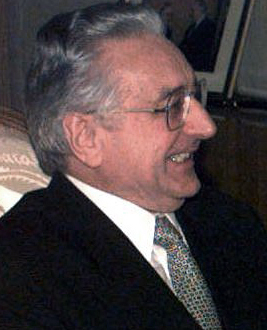
Tudjmanism or Tuđmanism is a form of Croatian nationalism which reached its strongest peak during the administration of Croatia's first president, Franjo Tuđman. Tuđman himself defined the ideology as non-communist nationalism with "re-examined Croatian history".
The Agreement on Friendship and Cooperation between Bosnia and Herzegovina and Croatia was signed by Alija Izetbegović, President of the Republic of Bosnia and Herzegovina, and Franjo Tuđman, President of the Republic of Croatia, in Zagreb on 21 July 1992 during the Bosnian and Croatian wars for independence from Yugoslavia. It established cooperation, albeit inharmonious, between the two and served as a basis for joint defense against Serb forces. It also placed the Croatian Defence Council (HVO) under the command of the Army of the Republic of Bosnia and Herzegovina (ARBiH).


